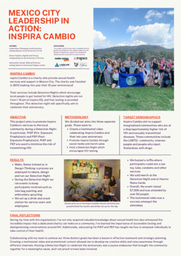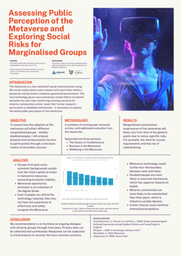“How will the metaverse broaden the digital divide?” - Laidlaw Research Project
In essence, the digital divide refers to the gap between those who benefit from our Digital Age and those who do not. As we culturally shift towards an economy and interpersonal life centring technology, there is a question of who gets to enjoy these prospering opportunities. One such example is the metaverse. Though usually represented as an all-consuming sensory experience based entirely within virtual reality (VR), there are also cases made for a virtual world designed around augmented reality (AR) – the same mechanics we use every day for Google Maps and Snapchat games. I intend to explore how the development of these technologies will affect minority groups – notably those with disabilities and/or poor socioeconomic backgrounds. While independent bodies such as The World Wide Web Consortium (W3C) can regulate the accessibility of the internet through international web standards, there is presently no organisation with the capacity or knowledge on how the metaverse falls into these accessibility standards.
Consequently, my research has a unique opportunity to identify the accessibility regulations necessary looking forward. Current literature critiquing the metaverse suggests abandoning the concept altogether in the name of wellbeing, but this is naïve considering the consistent growth and investment the sector is experiencing.
In the initial weeks of this project, I will research the nuances of different metaverse development approaches and the ramifications (particularly AR vs VR). Simultaneously, I will explore data regarding the digital divide, especially the Office for National Statistics and their research in digital inclusion. During weeks 3 and 4, I will use various research methods such as surveys and focus groups and analyse the broader public response to virtual/augmented reality. This research will include questions about their hopes for the metaverse and any barriers that they feel might limit their participation. Additionally, I will consider how these barriers contribute to long-term detriments to underrepresented groups, emphasising the digital divide. Finally, I will accumulate this information, considering practicality, with the intention of the research to shape regulation principles surrounding the metaverse.
To develop my research over the summer of 2023, I would be interested in exploring community representation in VR/AR. In recent history, there has been an increase in the use of AR to simulate mental health conditions such as schizophrenia by manipulating visual and auditory input to the user. Similar methods are used to demonstrate physical disabilities (e.g., wheelchair use) or tell narratives in educational resources (e.g., in museums). While these tools are effective in conveying personal experiences and facilitating understanding, these "experiences" must be appropriate representations. I intend to conduct an outreach program interviewing various members of underrepresented backgrounds to identify their goals in informative storytelling/simulation and what features of their story are most important to them.


Please sign in
If you are a registered user on Laidlaw Scholars Network, please sign in